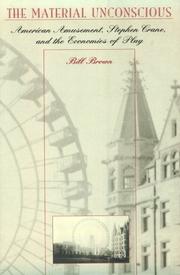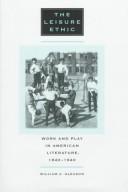| Listing 1 - 4 of 4 |
Sort by
|
Book
ISBN: 8884021073 9788884021076 Year: 1993 Volume: 3 Publisher: Roma: Salerno,
Abstract | Keywords | Export | Availability | Bookmark
 Loading...
Loading...Choose an application
- Reference Manager
- EndNote
- RefWorks (Direct export to RefWorks)
Play in literature --- Games in literature --- Recreation in literature --- Italian literature --- History and criticism --- Congresses

ISBN: 9780674553811 Year: 1996 Publisher: Cambridge, Mass Harvard University Press
Abstract | Keywords | Export | Availability | Bookmark
 Loading...
Loading...Choose an application
- Reference Manager
- EndNote
- RefWorks (Direct export to RefWorks)
Recreation in literature --- Literature and society --- Popular culture --- Materialism in literature --- Amusements in literature --- Economics in literature --- Play in literature --- History --- Crane, Stephen, --- Criticism and interpretation.

ISBN: 0804733996 0804734348 9780804733991 9780804734349 Year: 1999 Publisher: Stanford, Calif.: Stanford university press,
Abstract | Keywords | Export | Availability | Bookmark
 Loading...
Loading...Choose an application
- Reference Manager
- EndNote
- RefWorks (Direct export to RefWorks)
American literature --- Leisure --- Literature and society --- Recreation in literature. --- Leisure in literature. --- Work in literature. --- Play in literature. --- History and criticism. --- History --- History. --- American literature - 19th century - History and criticism. --- Leisure - United States - History - 19th century. --- American literature - 20th century - History and criticism. --- Literature and society - United States - History. --- Leisure - United States - History - 20th century.
Multi
ISBN: 9781107146273 9781316536544 9781316509456 1107146275 9781107145801 1107145805 9781316536186 9781316509203 1316509451 1316560473 1316561259 1316560864 1316562816 1316536548 1316509206 1316573109 1316572773 1316573435 1316573761 131657508X 1316536181 131655774X 1316570797 9781316562819 9781316561256 9781316575086 Year: 2016 Publisher: Cambridge, UK: Cambridge university press,
Abstract | Keywords | Export | Availability | Bookmark
 Loading...
Loading...Choose an application
- Reference Manager
- EndNote
- RefWorks (Direct export to RefWorks)
Why did eighteenth-century writers employ digression as a literary form of diversion, and how did their readers come to enjoy linguistic and textual devices that self-consciously disrupt the reading experience? Darryl P. Domingo answers these questions through an examination of the formative period in the commercialization of leisure in England, and the coincidental coming of age of literary self-consciousness in works published between approximately 1690 and 1760. During this period, commercial entertainers tested out new ways of gratifying a public increasingly eager for amusement, while professional writers explored the rhetorical possibilities of intrusion, obstruction, and interruption through their characteristic use of devices like digression. Such devices adopt similar forms and fulfil similar functions in literature as do diversions in culture: they 'unbend the mind' and reveal the complex reciprocity between commercialized leisure and commercial literature in the age of Swift, Pope, and Fielding.
Digression. --- Englisch. --- English literature --- English literature. --- Kommerzialisierung. --- Recreation in literature. --- Recreation --- Recreation. --- Roman. --- Unterhaltung. --- History and criticism --- History --- 1700-1799. --- Great Britain. --- Gro�britannien. --- Instrumentalists --- Music --- History of civilization --- anno 1400-1499 --- anno 1500-1599 --- Renaissance --- Instrumental music --- Social conditions --- Musicians --- Musique instrumentale --- Musique --- Musiciens --- Economic conditions --- Histoire et critique --- Conditions sociales --- Conditions économiques --- Literaire retoriek --- Engelse letterkunde --- anno 1600-1699 --- anno 1700-1799 --- 78.24 --- Literary rhetorics --- Instrumentalists - Social conditions --- Instrumental music - 15th century - History and criticism --- Instrumental music - 16th century - History and criticism --- History and criticism. --- Renaissance. --- Social conditions. --- Music, Instrumental --- Revival of letters --- Civilization --- History, Modern --- Civilization, Medieval --- Civilization, Modern --- Humanism --- Middle Ages --- Players (Music) --- Manners and customs --- Amusements --- Community centers --- Leisure
| Listing 1 - 4 of 4 |
Sort by
|

 Search
Search Feedback
Feedback About UniCat
About UniCat  Help
Help News
News